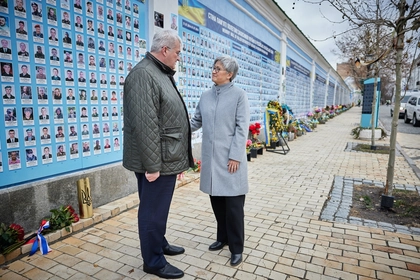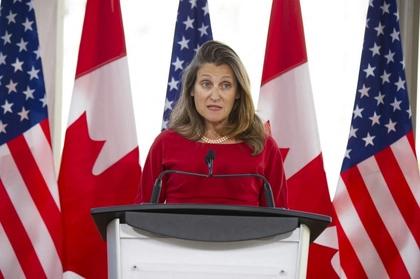A video circulating on social media allegedly showing a North Korean soldier, in Russian uniform, being fed adequately for the first time in his life after arriving in Ukraine to fight for Moscow – wasn’t just misleading it was totally wrong.
The man is Chinese, and he was simply describing what he was eating in Mandarin.
JOIN US ON TELEGRAM
Follow our coverage of the war on the @Kyivpost_official.
X user intelligencefnt shared two videos on Sunday evening that depicted the Asian man in Russian military uniform cooking and eating, to which the captions read: “A North Korean soldier arriving in Ukraine to fight for Russia expressed surprise at the variety and abundance of food provided: ‘I'm eating in the field. Look at this meat. Big beef, instant noodles…’”
In carrying out its own fact-checking, Kyiv Post confirmed the man was indeed eating instant noodles with beef, but was talking in Mandarin, the official language of China, not Korean. The man’s claim that he was on the front, seemed to be supported by the sound of Russian dialogue audible in the background, presumably in or near Ukraine, though Kyiv Post could not establish the time and place the video was taken.
Telegram channel exilenovaplus, whose watermark is visible on the videos, also stated that the man was Chinese in its Saturday social media post.
A North Korean soldier arriving in Ukraine to fight for Russia expressed surprise at the variety and abundance of food provided: "I'm eating in the field. Look at this meat. Big beef, instant noodles..." pic.twitter.com/15asmuY2Ne
— Intelligence FRONT (@intelligencefnt) November 3, 2024
In the first video, the man could be heard saying “Meal time … front line … beef noodles. Look at this beef, a lot of it. Add some instant noodles to it” in Mandarin at the beginning of the video

Australian Foreign Minister Visits Kyiv, Confirms Reopening of Embassy
At 0:25, he said “One can [of beef] and one pack of noodles” in Mandarin before slurping the noodles. He finished the first video with the vulgar phrase “за**ись,” which means “f**king awesome” in Russian.
A North Korean soldier arriving in Ukraine to fight for Russia expressed surprise at the variety and abundance of food provided: "I'm eating in the field. Look at this meat. Big beef, instant noodles..." pic.twitter.com/15asmuY2Ne
— Intelligence FRONT (@intelligencefnt) November 3, 2024
In the second video, the man could be seen describing his meal preparation – beef stew with tomatoes and potatoes – in Mandarin, where he said “Men who cook are extra handsome” between 0:11 and 0:13 before adding that it was possible to cook on the “front line” (“Qiánxiàn” in Mandarin).
At 0:25 he could be seen picking up a can of food that he said was beef before praising his own work at neatly opening the can.
The video cuts to another location at around 1:00, presumably after he finished cooking, when he started to comment on his meal.
At 1:15 he said “Lǎowài bù shí,” meaning the foreigners (presumably his Russian comrades) were not eating what he cooked, leaving him to feast on the whole pot by himself without the need to share.
Kyiv Post conjectured, though it was unable to locate the original source of the video, that it originated from Chinese social media, where some Chinese mercenaries fighting for Russia are frequently seen to have uploaded videos documenting their firsthand experience.
The lack of access to smartphones and social media in North Korea also rendered the claims that the man is a Korean fluent in Mandarin extremely unlikely.
News of the deployment of North Korean troops to Ukraine at Moscow’s behest began circulating in October, with evidence confirming Pyongyang troops’ presence in Russia.
However, reports about North Korean troops engaging Ukrainian troops in combat remain inconclusive – while Kyiv and Western intelligence have said that North Korean troops were fighting against Ukrainian troops in Russia’s Kursk region, with a video reportedly showing a heavily injured North Korean soldier talking in Korean surfacing over the weekend, there are no definitive reports to verify the claims.
In October, a Chinese mercenary fighting for Russia also claimed that eight Pyongyang officers were killed in action during their first day of deployment in Ukraine, though again there was no evidence in the video to sustain the claims.
You can also highlight the text and press Ctrl + Enter






